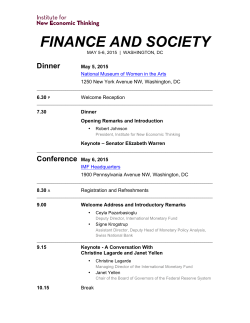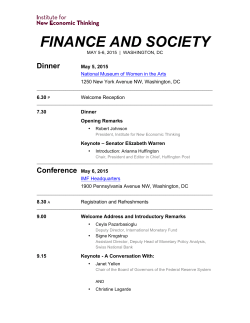
Econ165syllabus_sum15 - Economics
Economics 165: International Finance Stanford University Summer Quarter 2014-2015 Time and place: Instructor: Office: Phone: Email: Office hours: Tuesday/Thursday 11:00-12:50 Russell Boyer ??? 650-206-5414 (cell phone) russellboyer@gmail.com Tuesday/Thursday 2-3pm This course is designed to give students the tools to think about a wide variety of issues in international finance. At the heart of the presentation is a simple macromodel which captures the mechanisms which are important to re-equilibration of the economy in the short, intermediate and long runs. A key element of the model is distinguishing between policy initiatives and policy regimes. Classical results will be considered in depth: the equivalence between a monetary policy initiative and devaluation; exchange rate overshooting; and question of superiority of fixed versus flexible exchange rate regimes. Developments in the Eurozone will be analyzed within the framework of the model, with a key contention being that the failure of the euro was widely anticipated, even by those who promoted its adoption. Textbook Classic readings, by Hume, Friedman and Mundell, will place the development of this subject into an historical context. But the heart of the course will be the coverage of the material in the standard textbok on this subject: Paul Krugman, Maurice Obstfeld, and Marc Melitz, International Finance, 10th edition. Their textbook on international economics now comes in three formats: the complete book covers topics in both real theory, and in financial economics. We will be using the stand-alone half of the book that deals with financial topics only. Assessment To be provided. Important Dates Tuesday, June 22 Saturday, August 15 First day of class Final exam, 8:30-11:30 Course outline I Introduction to Analytical Tools of International Macro 1. Current Topics in International Finance a. Is the Euro System Working? b. Is Europe an Optimum Currency Area? c. Desirability of Fixed Vs. Flexible Exchange Rates 2. Tools for Open Economy Macro Analysis Chapter 10 Chapter 10 II 3. 4. 5. 6. 7. 8. 9. 10. 11. III 12. 13. 14. 15. a. National Income Accounting b. Balance of Payments Accounting c. The Foreign Exchange Market d. Purchasing Power Parity The Theoretical Model Output in the Short Run under Fixed Exchange Rates Fiscal and Trade Policy in the Short Run Devaluation in the Short Run Policies in the Intermediate Run The Asset Markets Fiscal and Trade Policy under Flexible Exchange Rates Monetary Policy in the Short and Intermediate Runs The Equivalence of Monetary and Exchange Rate Policies How the Exchange Rate is Managed History, International Monetary Systems, and Current Topics International Monetary Systems: An Historical Overview Financial Globalization: Opportunity and Crisis Optimum Currency Areas and the Euro Developing Countries: Growth, Crisis and Reform Chapter 2 Chapter 2 Chapter 3 Chapter 5 Chapter 6 Chapter 6 Chapter 6 Chapter 6 Chapters 3, 4 & 6 Chapter 6 Chapters 5 & 6 Chapter 7 Chapter 8 Chapter 9 Chapter 10 Chapter 11
© Copyright 2025

















